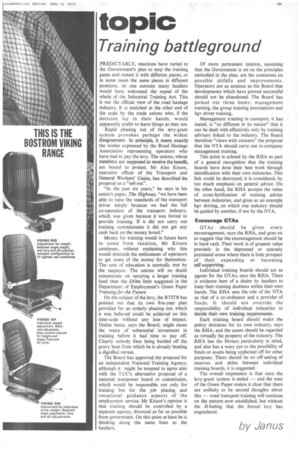topic
Page 75

If you've noticed an error in this article please click here to report it so we can fix it.
Training battleground
PREDICTABLY, reactions have varied to the Government's plan to stop the 'training game and restart it with different pieces, or in some cases the same pieces in different positions. At one extreme many hauliers would have welcomed the repeal of the whole of the Industrial Training Act. This is not the official view of the road haulage industry. It is matched at the other end of the scale by the trade unions who, if the decision lay in their hands, would apparently prefer to leave things as they are.
Rapid phasing out of the levy-grant system provokes perhaps the widest disagreement. In principle, it meets exactly the wishes expressed by the Road Haulage Association representing operators who have had to pay the levy. The unions, whose members are supposed to receive the benefit, are bound to protest. Mr Alex Kitson, executive officer of the Transport and General Workers' Union, has described the proposal as a "sell-out".
"In the past six years," he says in his union's paper, The Highway, "we have been able to raise the standards of the transport driver simply because we had the full co-operation of the transport industry, which was given because it was forced to provide training. If it did not carry out training commitments it did not get any cash back on the money levied."
Money for training would in future have to • come from taxation, Mr Kitson continues, without explaining why this would diminish the enthusiasm of operators to get some of the money for themselves. The cost of education is normally met by the taxpayer. The unions will no doubt concentrate on securing a larger training fund than the £40m limit suggested in the Department of Employment's Green Paper Training for the Future.
On the subject of the levy, the RTITB has pointed out that its own five-year plan provided for an orderly phasing out, which it was believed could be achieved on this time-scale without any loss of impact. Undue haste, says the Board, might mean the waste of substantial investment in training before it had time to pay off. Clearly nobody likes being hustled off the gravy boat from which he is already beating a dignified retreat.
The Board has approved the proposal for an independent National Training Agency, although it might be tempted to agree also with the TUC's alternative proposal of a national manpower board or commission, which would be responsible not only for training but for the job placing and vocational guidance aspects of the employment service. Mr Kitson's opinion is that training should be controlled by a separate agency, divorced as far as possible from government. On this point at least he is thinking along the same lines as the hauliers. Of more permanent interest, assuming that the Government is set on the principles embodied in the plan, are the comments on possible pitfalls and improvements. Operators are as anxious as the Board that developments which have proved successful should not be abandoned. The Board has picked out three items: management training, the group training associations and hgv driver training.
Management training in transport, it has stated, is "so different in its nature" that it can be dealt with effectively only by training advisers linked to the industry. The Board therefore "views with concern" the proposal that the NTA should carry out in-company management training.
This point is echoed by the RHA as part of a general recognition that the training hoards have done their best work through identification with their own industries. This link could be destroyed, it is considered, by too much emphasis on general advice. On the other hand, the RHA accepts the value of cross-fertilization of training advice between industries, and gives as an example hgv driving, on which one industry should be guided by another, if not by the NTA.
Encourage GTAs
GTAs should be given every encouragement, says the RHA, and goes on to suggest that the encouragement should be in hard cash. Their work is of greatest value precisely in the depressed or sparsely populated areas where there is little prospect of their expanding or becoming self-supporting.
Individual training boards should act as agents for the GTAs, says the RHA. There is evidence here of a desire by hauliers to keep their training destinies within their own hands. The RHA sees the role of the NTA as that of a co-ordinator and a provider of funds. It should not override the responsibility of individual industries to
decide their own training requirements. ,
Each training board should make the policy decisions for its own industry, says the RHA, and the assets should be regarded as virtually the property of the industry. The RHA has the Motecs particularly in mind, and also has a wary eye to the possibility of funds or assets being syphoned off for other purposes. There should be no off-setting of reserves and debts between individual training boards, it is suggested.
The overall impression is that once the levy-grant system is ended — and the tone of the Green Paper makes it clear that there are unlikely to be second thoughts about this — road transport training will continue on the pattern now established, but without the ill-feeling that the forced levy has engendered.
by Janus
















































































































































































































